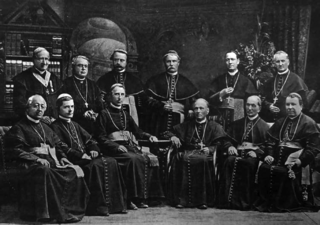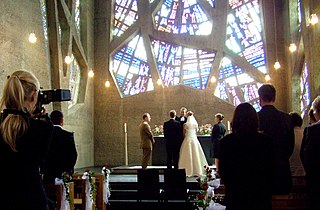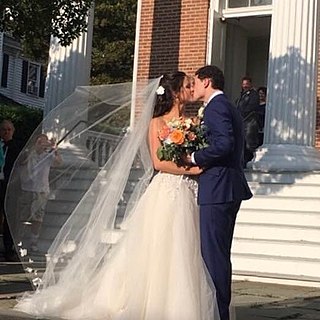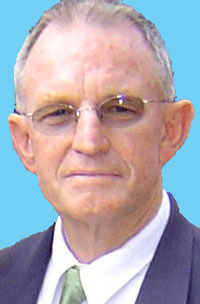
A priest is a religious leader authorized to perform the sacred rituals of a religion, especially as a mediatory agent between humans and one or more deities. They also have the authority or power to administer religious rites; in particular, rites of sacrifice to, and propitiation of, a deity or deities. Their office or position is the 'priesthood', a term which also may apply to such persons collectively. A priest may have the duty to hear confessions periodically, give marriage counseling, provide prenuptial counseling, give spiritual direction, teach catechism, or visit those confined indoors, such as the sick in hospitals and nursing homes.

A wedding is a ceremony where two people are united in marriage. Wedding traditions and customs vary greatly between cultures, ethnic groups, religions, countries, and social classes. Most wedding ceremonies involve an exchange of marriage vows by a couple, the presentation of a gift, and a public proclamation of marriage by an authority figure or celebrant. Special wedding garments are often worn, and the ceremony is sometimes followed by a wedding reception. Music, poetry, prayers, or readings from religious texts or literature are also commonly incorporated into the ceremony, as well as superstitious customs.

Clergy are formal leaders within established religions. Their roles and functions vary in different religious traditions, but usually involve presiding over specific rituals and teaching their religion's doctrines and practices. Some of the terms used for individual clergy are clergyman, clergywoman, clergyperson, churchman, ecclesiastic, and cleric, while clerk in holy orders has a long history but is rarely used.
Presbyterianpolity is a method of church governance typified by the rule of assemblies of presbyters, or elders. Each local church is governed by a body of elected elders usually called the session or consistory, though other terms, such as church board, may apply. Groups of local churches are governed by a higher assembly of elders known as the presbytery or classis; presbyteries can be grouped into a synod, and presbyteries and synods nationwide often join together in a general assembly. Responsibility for conduct of church services is reserved to an ordained minister or pastor known as a teaching elder, or a minister of the word and sacrament.

The Evangelical-Lutheran Church in Denmark or National Church, sometimes called the Church of Denmark, is the established, state-supported church in Denmark. The supreme secular authority of the church is composed of the reigning monarch and Denmark's Parliament, the Folketing. As of 1 January 2023, 72.1% of the population of Denmark are members, though membership is voluntary.

In Christianity, a minister is a person authorised by a church or other religious organization to perform functions such as teaching of beliefs; leading services such as weddings, baptisms or funerals; or otherwise providing spiritual guidance to the community. The term is taken from Latin minister. In some church traditions the term is usually used for people who have been ordained, but in other traditions it can also be used for non-ordained.
In Christianity, the term secular clergy refers to deacons and priests who are not monastics or otherwise members of religious life. Secular priests are priests who commit themselves to a certain geographical area and are ordained into the service of the residents of a diocese or equivalent church administrative region. That includes serving the everyday needs of the people in parishes, but their activities are not limited to that of their parish.

In Australia, celebrants or civil celebrants are people who conduct formal ceremonies in the community, particularly weddings – which represent the main ceremony of legal import conducted by celebrants –, and for this reason are often referred to as marriage celebrants. They may also conduct extra-legal ceremonies such as naming of babies, renewal of wedding vows, funerals, divorces, becoming a teenager, changing name, significant birthdays, retirements, and other life milestones. Officiating at a marriage requires that the celebrant be an authorised marriage celebrant under Australian law, or the law where the marriage takes place, but officiating at non-legal ceremonies does not.

A marriage officiant or marriage celebrant is a person who officiates at a wedding ceremony.

A humanist celebrant or humanist officiant is a person who performs humanist celebrancy services, such as non-religious weddings, funerals, child namings, coming of age ceremonies and other rituals. Some humanist celebrants are accredited by humanist organisations, such as Humanists UK, Humanist Society Scotland (HSS), The Humanist Society (US), and the Humanist Association of Canada (HAC).

Celebrancy is a profession founded in Australia in 1973 by the then Australian attorney-general Lionel Murphy. The aim of the celebrancy program was to authorise persons to officiate at secular ceremonies of substance, meaning and dignity mainly for non-church people. Up until this point legal marriages were reserved only to clergy or officers of the Births, Deaths & Marriages registry office. These appointed persons, referred to in the Marriage Act of Australia as "authorised celebrants", create & conduct weddings, funerals, namings, house dedications, coming of age and other life ceremonies for those who do not wish to be married or have other ceremonies in a church or registry office.
A self-uniting marriage is one in which the couple are married without the presence of a third-party officiant. Although non-denominational, this method of getting married is sometimes referred to as a "Quaker marriage", after the marriage practice of the Religious Society of Friends, for which see Quaker wedding.

In Belgium, organized secularism is the local associations and organizations which provide moral support for naturalist, atheist, agnostic, secular humanist, freethinking, Bright, or irreligious and non-confessional citizens. A person who subscribes to such entities or ideologies, or at least espouses an interest in "free inquiry" apart from religious traditions is described as a "secular" or "free-thinker".

Marriage in New Zealand is governed by an Act of Parliament. The minimum marriage age is 18 years, or 16 years with consent of the Family Court. Polygamous marriages are not permitted in New Zealand. There are prohibitions of marriages between some relatives and some who are already in a civil union.

Dally Messenger III, is the grandson of the renowned Rugby Union and Rugby League footballer, H.H. “Dally” Messenger. From 1974 he gained prominence as a developer and media spokesperson of the fledgling civil celebrant program founded by innovative Australian Attorney-General, Lionel Murphy.
An ordination mill is a religious organization or denomination in which membership is obtainable by trivial means and all members are qualified for self-ordination as a minister of religion, bishop, priest or deacon without any prerequisite training, work, experience, seminary study or other qualification. In some cases, ordination may be obtained online or by mail merely by submitting an application and a nominal fee.

A civil funeral celebrant is a person who officiates at funerals which are not closely connected with religious beliefs and practises. They are analogous to civil celebrants for marriage ceremonies. Civil celebrant funerals began in Australia in 1975. As secular (civil) wedding ceremonies became accepted, first in Australia and then in other Western countries, a similar process for funerals has since been established in New Zealand, the United Kingdom, Canada and the United States. Civil funeral celebrants are often also civil marriage ceremony celebrants.

The legal status of the Universal Life Church encompasses a collection of court decisions and state executive branch pronouncements determining what rights the Universal Life Church (ULC) and comparable organizations have as religious organizations.

The Universal Life Church (ULC) is a non-denominational religious organization founded in 1962 by Kirby J. Hensley, under the doctrine: "Do that which is right". The Universal Life Church advocates for religious freedom, offering legal ordination to become a minister free of charge, to anyone who wishes to join. The ULC has ordained ministers from a wide range of backgrounds and beliefs, including Christians, atheists, Wiccans, pagans, Jews, and people of many other faiths.















